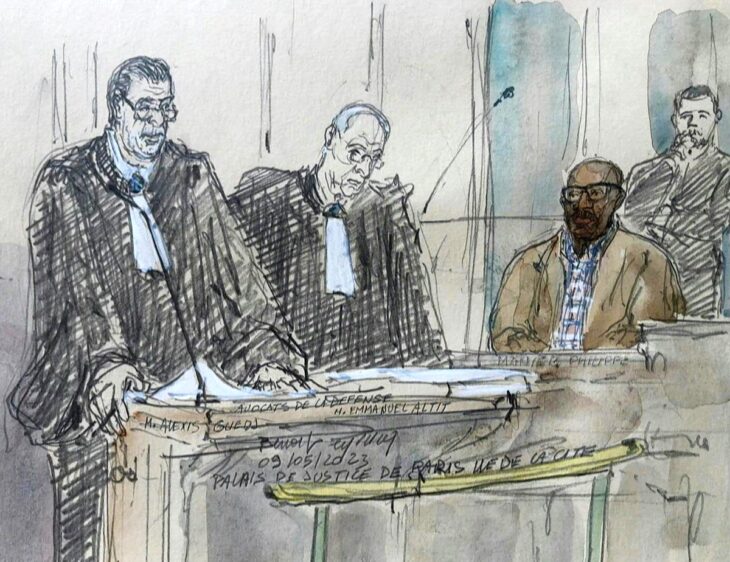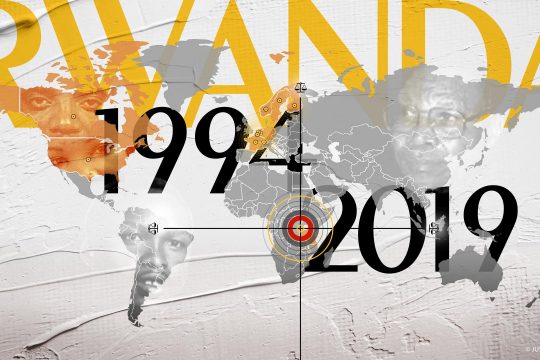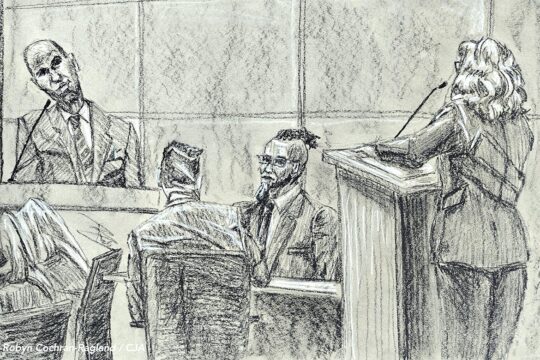At the opening of his trial on Wednesday May 10, Philippe Hategekimana pleaded not-guilty before the Paris court. The man, who acquired French nationality in 2005 under the name Philippe Manier, is accused of "genocide, crimes against humanity and participation in a conspiracy" to commit these crimes. This trial comes 29 years after the events, and is the fifth trial in France on the 1994 genocide of Tutsis in Rwanda.
For his trial - filmed like the previous ones for the historical archives of French justice - more than 100 witnesses are expected. Many of them will travel from Rwanda, while others will be heard by video conference, some from Rwandan prisons where they are serving their sentences for participation in the 1994 genocide. In addition to the 40 or so civil parties already constituted, other requests were added at the opening of the trial. Their number could thus reach nearly 100, essentially survivors and relatives of victims and victims’ associations like the Collective of Civil Parties for Rwanda (CPCR), Ibuka and the International League against Racism and Anti-Semitism (Licra).
Biguma, "the one who lets nothing pass”
In the course of his life, the defendant in the blue checked shirt and large black-rimmed glasses has gone by several names: Philippe Hategekimana, alias Biguma, alias Hakizimana, alias Philippe Manier. From his childhood in Nyagisozi, southern Rwanda, with his Hutu farmer parents, Philippe Hategekimana - his baptismal name – has kept the nickname "Biguma", meaning "the one who lets nothing pass”. This comes, according to him, from one of his particularly severe teachers. Later he adopted the name Philippe Hakizimana at a refugee camp on the Congolese border "because the former soldiers could be spotted, so it was better to change my name". He took the name Philippe Manier when he became a French citizen.
All these names have been used over the years in other trials, in Rwanda and as far away as Norway, and could cast doubt on the fact that he was indeed present at the time of the events. Before the hearings started his lawyers Alexis Guedj, Emmanuel Altit and Fabio Lhote tried unsuccessfully to use this doubt to get the trial postponed.
Accused of active participation in genocide
In the dock, with a crutch leaning against his chair - he had knee surgery while in detention -, the 66-year-old former gendarme listens attentively to the account of his life and the long litany of the alleged facts as presented by court president Jean-Marc Lavergne. He will have to answer for the roadblocks erected on the territory of the Nyanza gendarmerie where he was chief warrant officer, in the province of Butare. This was a policy throughout the country to filter the population, identify fleeing Tutsis and exterminate them. He is said to have directly assassinated several dozen people at two of these roadblocks. On April 23, 1994, he is said to have ordered - and even committed - the murders of Tutsi gendarmes and of Narcisse Nyagasaza, a Tutsi mayor from the neighbouring commune of Ntyazo. On the same day, he allegedly took part in the massacre on Nyabubare hill where some 300 Tutsis were killed. According to witnesses cited by the prosecution, he played a central role as organizer and leader, ordering mortar fire and urging the civilian population to finish off the survivors and dying victims. Four days later, he was said to have done the same on the Nyamure hill, where thousands of Tutsis had taken refuge. Finally, the prosecutor accused him of having participated in the preparation of a massacre of Tutsis that took place at Isar Songa, the Rwandan Institute of Agricultural Sciences, on April 29.
Nyanza gendarmerie’s “Human Resources Manager”
Hategekimana asserts that he did not participate in these murders because, he says, within the Nyanza gendarmerie company he only played the role of a manager, taking care of the assignments of the various units, and only very rarely went to the field. And this role of "HR director", he said during the investigation, did not change with the start of the genocide. He says he helped refugees fleeing Kigali and the first massacres in the capital, and never adhered to the idea that the Tutsis were the enemy -- even though he spent a year fighting the Rwandan Patriotic Front (RPF) on the frontline in the north of the country in 1990.
Twenty years later, he stated during the personality investigation conducted for the trial that the difficulties between Tutsis and Hutus were due solely to the manipulation of politicians. The defence notes that his wife was the product of a mixed marriage between a Hutu and a Tutsi.
In April 1994, Hategekimana says, he "calmed down" the "extremist gendarmes", refusing to engage in the massacres. This brought him trouble, he told the investigation. “The sub-prefect threatened me because I did not kill Tutsis, because I did not want Tutsis to be killed," he said. “He blamed me for that, he told me 'you have no place in the company'. That's how I was transferred, or so I think.” As soon as the massacres began in the Nyanza region, in the second half of April 1994, he was transferred to Kigali, to the Gendarmerie Headquarters, to the close protection unit of Colonel Laurent Rutayisire.
Flight from Rwanda after the genocide
In July 1994, Hategekimana fled the RPF advance, found his wife Jacqueline and their three children and left for the Democratic Republic of Congo. At the Kashusha refugee camp, he exchanged his surname for new papers in the name of Philippe Hakizimana and stayed there for six months, until the camp was attacked by the RPF. His mother and other members of his family were killed during that attack. He fled with his wife and children. From then on, his exile route is unclear and his account varied during the investigation. He said the family went to Congo-Brazzaville, then to Cameroon. He spoke of a congregation of nuns who took them in and helped them in these two countries, but whose name he no longer remembers; of a long journey on foot, of dead-end jobs and daily survival, until his wife Jacqueline and their youngest son left for France in 1998, after paying a migrant smuggler. He joined them in 1999, with the other children.
In the suburbs of Rennes, where the family had taken up residence, the couple applied for asylum under the name Hakizimana and invented a past. He said he was a physical education teacher in the Rwandan capital Kigali, and she a social worker at the hospital. In court, Philippe Hategekimana admitted that he was "not very truthful" in his request for asylum. "But please understand that those who had a military career did not get asylum, or it took a very long time!” he said. The French Office for the Protection of Refugees and Stateless Persons (Ofpra) accepted his story in 1999, the family settled and obtained naturalization in 2005 and “Frenchified” their name.
Philippe and Jacqueline are now called Manier. From the past, they have kept some cultural ties. Philippe maintains these within a Rwandan association that organizes songs, dances and other events. The former gendarme worked as a security guard at the University of Rennes 2 for 15 years, before being dismissed because of too many unjustified absences. "I was very tired,” he said when the court asked him about it. “You know, the strikes at Rennes 2 were very hard and I had five of them. So I was tired." Kicked out, he had a series of fixed-term contracts in security companies interspersed with unemployment. That was up to 2015.
What Philippe Manier did not know was that three years earlier, his name appeared in an anonymous letter of denunciation that Alain and Dafrosa Gauthier, founders of the Collectif des parties civiles pour le Rwanda (CPCR), say they received in 2012 and filed with the court. Intrigued, the Gauthiers went to Rwanda and interviewed victims of the massacres in the Nyanza region.
CPCR complaint and flight to Cameroon
On June 5, 2015, the CPCR filed a complaint with a civil party at the Paris public prosecutor's office. The case came out in the media, and Philippe Manier knew he was being targeted. Less than two years later, he fled to Cameroon, where his daughter lives, having obtained a three-month "humanitarian" visa. The three months ended and Manier did not return. Targeted by an international arrest warrant, he was finally arrested in Yaoundé in November 2018 by the Cameroonian authorities, while waiting for his wife at the airport. Extradited to France in February 2019, he was incarcerated in Nanterre and put in solitary confinement, where he spent more than four years in pre-trial detention.
To the president of the court, who was very interested in the accused’s creative accounts to the authorities, Hategekimana said on May 10 that of course he intended to return to France "later", with his wife. And that no, he was not in Cameroon for "humanitarian" reasons: "It was just the reason my daughter had given so that I could come longer. I thought that a warm country was good for my health." The president was annoyed. “If I understand correctly, you are lying for a good cause?" he asked. "Yes," the accused replied.
Hategekimana’s trial is being held in Paris until June 30.
This article was modified on 28/05/2023. Mayor Narcisse Nyagasaza, assassinated in April 1994, was a Tutsi, not a Hutu.








